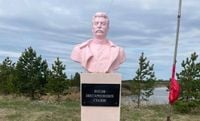In a notable event reflecting the ongoing debate around historical figures, residents of Bashkortostan recently voted against the installation of a monument to Joseph Stalin in their village. This decision emerged during a meeting held on April 17, 2025, in the village of Amirovo, Buzdyaksky district, where local residents gathered to discuss the proposal. The initiative to erect the bust was put forth by a local activist with communist views, but it faced significant opposition from the community.
According to ex-deputy from the Communist Party of the Russian Federation, Rustam Khafizov, the proposal to place Stalin's bust near the memorial dedicated to those who died in the Great Patriotic War was rejected by a majority vote. Specifically, 15 residents voted against the installation, highlighting a clear division in public sentiment regarding Stalin's legacy.
Local resident Lyaysan Iskhakova was among those who voiced strong objections to the monument. She articulated the concerns shared by many in her community, stating, "It is not worth forgetting about the millions of victims of Stalinist repressions, deportations, collectivization, and political killings. Stalin is a controversial figure in history, and his name is associated not only with victory in the war. Installing a bust in his honor would create a rift in society and offend the feelings of many whose families suffered under his regime."
This sentiment resonates with broader trends in Russia, where discussions about Stalin often evoke passionate responses. Just last month, activists in Barnaul organized a protest against the so-called "Stalin Center," which was established in December 2023, also by a member of the Communist Party of Russia. The activists argued that such centers distort history and that the cult of personality surrounding Stalin has no place in contemporary society.
On the other hand, the leadership of the Novosibirsk Regional Committee of the Communist Party of the Russian Federation held a different view. On May 8, 2025, they gathered to lay flowers at a people's monument dedicated to Stalin, coinciding with the eve of the 80th anniversary of the Great Victory. This event was marked by speeches from prominent party figures, including Anatoly Lokot, the first secretary of the regional committee, and members of the State Duma.
During the ceremony, Lokot emphasized the importance of remembering Stalin, stating, "We came here to honor the memory of the Supreme Commander, the leader of the Communist Party, the leader not only of the victorious country — the USSR — but also of the entire anti-Hitler coalition, which he actually created." He described the act of honoring Stalin as a way to unite party members and distinguish "one's own" from "alien" in today's society.
Lokot further elaborated on the necessity of recognizing not just the military victories of the Red Army but also the triumph of the Soviet economy during the war. He remarked on the strategic operations that allowed the Soviet Union to overcome significant challenges, asserting that the victory was largely achieved through the efforts of the Soviet people and their economy. He recalled a poignant moment from the memoirs of famed pilot Alexander Pokryshkin, who, during a visit to Novosibirsk, expressed admiration for the children working in factories, promising them that victory would come.
The contrasting perspectives between the residents of Amirovo and the party leaders in Novosibirsk underscore the complexities of Stalin's legacy in Russia today. While some view him as a controversial figure whose actions resulted in immense suffering, others celebrate his role in the Soviet victory during World War II and the establishment of a superpower.
In a further development, it was reported that the bust of Stalin will now be placed on private property, following the community's decision. This outcome reflects a compromise amidst heated discussions and illustrates the ongoing struggle to reconcile differing views on historical figures in contemporary Russia.
The discussion surrounding Stalin's legacy is not confined to local communities; it resonates on a national level, where the Communist Party continues to advocate for a narrative that emphasizes Soviet achievements while downplaying the darker aspects of Stalin's rule. As the country prepares to commemorate significant anniversaries related to World War II, these debates are likely to intensify, revealing the deep divisions within Russian society regarding its past.
As the memory of Stalin remains a polarizing issue, it raises important questions about how history is remembered and interpreted in modern Russia. The ongoing dialogue reflects a society grappling with its past, as different generations and political factions seek to define what legacy they wish to uphold.
Ultimately, the discussions surrounding monuments, memorials, and historical narratives will continue to shape the cultural landscape of Russia, as citizens navigate the complexities of their shared history.




